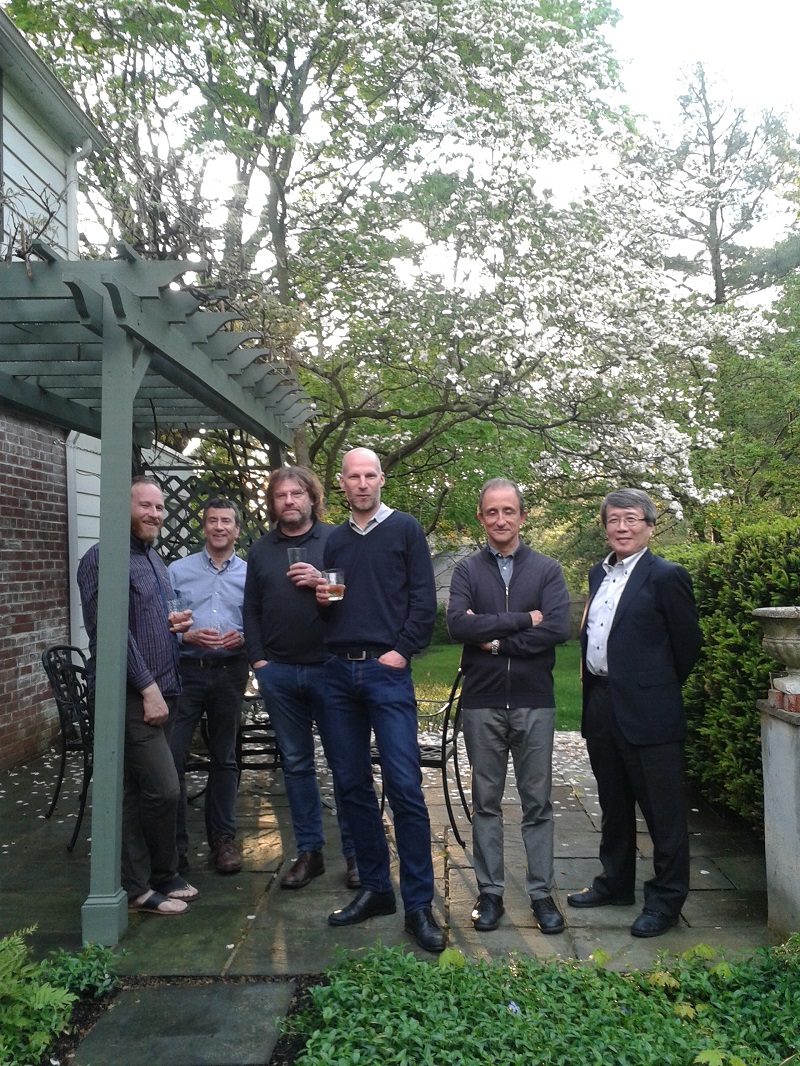2016.05.25
第2回サマースクール報告(5日目) GHC Summer School 2016 Report (Day 5)
サマースクール5日目は、1つのメソッド・セッションと1つのセッションが行われた。まず、ベルリン拠点のAndreas Eckert 教授(ベルリン・フンボルト大学)およびSebastian Conrad教授(ベルリン自由大学)によって、「グローバル・インテレクチュアル・ヒストリーとは何か? What is Global Intellectual History?」というタイトルでメソッド・セッションが行われた。このメソッドに関するアサインメントとして、Samuel Moyn and Andrew Sartori, “Approaches to Global Intellectual History,” in Samuel Moyn and Andrew Sartori, eds., Global Intellectual History (New York: Columbia UP, 2013)およびSebastian Conrad, “Ch. 10 Global History for Whom? The Politics of Global History,” What Is Global History? (Princeton: Princeton University Press, 2016)が課された。最初にEckert教授から、グローバル・ヒストリーという考えが広く共有されつつあること、そして、そのため、グローバル・インテレクチュアル・ヒストリーというサブフィールドが生まれていることが説明され、グローバル・インテレクチュアル・ヒストリーがグローバル・ヒストリーに対してどのような貢献ができるかという問題提起がなされた。Conrad教授からは、自身が日独歴史理論を専門としていることから、非西洋中心主義的なインテレクチュアル・ヒストリーが少ないという問題を指摘していた。
その後のディスカッションでは、同時期に異なる地域で同じような思想が何の交流もなしに生み出される現象をいかに理解すべきかをめぐって多くの議論がなされた。また、Conrad教授の問題意識を引き継ぎながら、アジアのインテレクチュアル・ヒストリーを欧米のインテレクチュアル・ヒストリーを研究している者に対して、西洋中心主義に陥らずに、どのように読ませるよう説得するかという疑問も投げかけられた。さらに、グローバル・ヒストリーの観点から古代・中世の思想を読み解くことの可能性と、アナクロニズムに陥ってしまう危険性などについて議論が行われた。その他にも、受容と創出(reception and invention)の関係、現在主義と歴史主義との関係をめぐって意見が交わされた。
サマースクール最後のセッションは、杉浦未樹教授(法政大学)がチェアをつとめ、20世紀における東アジアおよびヨーロッパの思想史に関する報告がなされた。まず、Susanne Schmidt氏(Cambridge University)は「流行のジェンダー——1970年代の世界的なマスメディアにおけるフェミニズムの消失 The Gender of Popularity: The Disappearance of Feminism in the Global Mass Media in the 1970s」 と題した報告をおこなった。氏は、Gail Sheehy によるPassages: Predictable Crises of Adult Life (1976)という著作が世界各国で翻訳されていく過程に注目し、その過程でジェンダー性が取り除かれたりしながら世界中に流通していったことを示す。それにより、メディア研究とジェンダー研究の両方を架橋しようと試みている。質疑応答では、氏が論文内で注目した国や都市以外にもPassageが翻訳・流通していたという情報が提供され、誰がどのような理由でその翻訳をおこなったかの各国比較の可能性が議論された。その他にも、ミドル・クライシスに対する精神科医の反応やPassagesに各地で関わったフェミニストの特徴の違いなどについての質問が行われた。
最後に、Dongxiang Xu氏(社会科学高等研究院)が「アジアは1つ——アジア主義と中国および日本の「国粋」知識人集団 Asia is One: Pan-Asianism in Two Chinese and Japanese Intellectual Groups of ‘National Essence’」というタイトルで報告をおこなった。Xu氏の関心は、アジアという概念がいかに中国において形成されてきたかを描くことにある。今回の発表では、中国と日本のアジア主義団体として、1908年に日本で設立された政教社、および、それに影響を受けながらも異なる展開をした中国の国粋派の活動に注目する。氏の議論で興味深い点が、1908年に国粋派のメンバーが東京で設立した亜洲和親会には、国家主義と国際主義が共存する思想を見出すことができると指摘した点である。フロアからは、ヨーロッパにおけるアジアという概念の使用が、アジアにおけるその概念の使用に影響を与えたかどうか、アジアという概念がアジアでいつどのように使われ始めたか、アジア主義においてジェンダーはどう位置づけられるかなどの質問がなされた他、アジア内部でも日本とインドではアジアという概念に与えるニュアンスが異なるというコメントが行われた。
5日間にわたるサマースクールの総括では、参加した学生と教員の間で、サマースクールの感想や可能性に関して自由に意見が交換された。まず、学生たちが参加を通じて得た経験が共有された。たとえば、メソッド・セッションという今年からの新たな取り組みに対し、学生からの好反応が次々に述べられた。というのも、このセッションの導入より、グローバル・ヒストリーに関する最低限の知識や分析視角を参加者の間で共有することができたからである。また、各国の議論のスタイルの違いがあることもわかった。また、自国ではあまりなじみのないトピックを聞いたことにより、時代や地域を超えた共通点・相違点について考える良い機会となった。さらに、グローバル・ヒストリーをおこなう上での言語の問題やそれを解決する1つの方法としての共同研究の可能性が議論された。とくに、後者は昨年のサマースクール参加者によって、複数著者の共著による論文の投稿が目指されている。
学生からはさらに、次回以降のサマースクール開催にあたっての提案がなされた。たとえば、参加者があらかじめ提出したペーパーが、博士論文のプロポーザルであったり、博士論文の一部の章であったりと、人によって違いがあったため、最初のページでなぜそのペーパーをグローバル・ヒストリーの会議で議論する必要があるのかをある程度書くと議論がスムーズになるのではないかという提案が行われた。それに関連して、セッションのモデレーターが、報告がいかにグローバル・ヒストリーとつながるかを説明し、ある程度のディスカッションの方向性を示してはどうかという提案がなされた。それに関連しメソッド・セッションでのレクチャーにおいていくつかの問題を設定することの可能性も議論された。
以上の発言を踏まえ、教員からもサマースクールの改善点が述べられた。第一に、提出するペーパーの形式をもう少し共有すること、および、提出されたペーパーに対し教員がフィードバックを与え、学生がそれに応えることなどがあげられた。第二に、メソッド・セッションの内容を、参加学生のペーパーに即して微調整をおこなうことなどがあげられた。そのような改善点を踏まえ、来年のベルリン拠点によるサマースクールの抱負が述べられた。
(文責・藤本大士)
The fifth day included one method session, one student session, and the wrap-up session. In the method session, Professor Andreas Eckert (Humboldt University of Berlin) and Professor Sebastian Conrad (Free University of Berlin) gave a lecture entitled “What is Global Intellectual History?” They assigned a couple of articles: Samuel Moyn and Andrew Sartori, “Approaches to Global Intellectual History,” in Samuel Moyn and Andrew Sartori, eds., Global Intellectual History (New York: Columbia UP, 2013); and Sebastian Conrad, “Ch. 10 Global History for Whom? The Politics of Global History,” What Is Global History? (Princeton: Princeton University Press, 2016). Professor Eckert explained that the concept of global history spreads to international scholarships; further, new subfields have been emerging, such as global intellectual history. He considered how global intellectual history could contribute to global history in general. Based on his specialty of historical theories in Germany and Japan, Professor Conrad noted that global historians still hold the Euro-centric view and overlook non-Euro-centric works regarding intellectual history.
In the following discussion, the participants argued that scholars should understand the emergence of similar ideas in different places. Based on Professor Conrad’s idea, a student posed a question as to how Asian intellectual history could draw the attention of intellectual historians in Europe and North America. Participants discussed the possibility and limits of locating ancient history and history of the Middle Ages in global history. They dealt with other topics, such as the relationships between reception and invention and presentism and historicism.
Professor Miki Sugiura (Hosei University) chaired the final student session. The first speaker was Ms. Susanne Schmidt (Cambridge University), who presented a paper entitled “The Gender of Popularity: The Disappearance of Feminism in the Global Mass Media in the 1970s.” She examined how Gail Sheehy’s book—Passages: Predictable Crises of Adult Life (1976)—circulated throughout the world. She pointed out that many countries translated the book, and some removed the characteristics of gender from the book. Her project, therefore, can bridge works of media studies and gender studies. The floor offered translated editions of Passages from other countries, which Ms. Schmidt could not deal with in her paper. Some participants asked questions about the response from medical professions to midlife crises and the characteristics of feminists in the 1970s.
As the final lecturer, Mr. Dongxiang Xu (EHESS) delivered a talk entitled “Asia is One: Pan-Asianism in Two Chinese and Japanese Intellectual Groups of ‘National Essence.’” He aimed to elucidate how the concept of Asia was reformed and circulated in modern China. His paper focused on the two Pan-Arianism intellectual groups in Japan and China. The Japanese group Seikyōsha (literally, Society for Political Education) was founded in 1908, and the Chinese group Guocui pai (literally, National Essence Group) was influenced by Seikyōsha. He also elucidated the close relationship between nationalism and internationalism in the Asiatic Humanitarian Brotherhood, which was formed in Tokyo in 1908 by the members of Guocui pai. In the discussion, the participants posed a number of questions and comments regarding how Asian countries received the concept of Asia (invented in Europe), when Asian countries started to use the term Asia, how the lecturer’s argument connected to gender studies, and how Japan and India used the term Asia when their intentions regarding its use were completely different.
The summer school ended with the wrap-up session. First, students shared their takeaways. They agreed that the method sessions were generally very helpful because they enabled participants to learn important ideas and perspectives in global history. A student pointed out that the styles of discussion were very different in other countries. Some participants stated that the summer school offered a good opportunity to consider commonalities and differences in histories. Some hoped to organize collaborative works to deal with language problems, as participants in the last summer school did; consequently, the latter group has been coauthoring papers.
Second, the students put forward some suggestions for the next summer school. Several students wanted to learn broader contexts for their submitted papers and suggested that they should express their intentions toward global history in the introductions of papers. Some students asked moderators to indicate how a student’s argument could be connected to global history. One student proposed that method sessions should include not only lectures but also points at issue.
Third, professors reacted to the students’ comments. As for submitted papers, professors could instruct students to write papers in the same style. Students could seek feedback from professors after submitting papers. As for method sessions, the themes of the session could be modified according to content of submitted papers. The professors from Berlin closed the session with their plan for the next summer school to be held in their city.
(Hiro Fujimoto)














